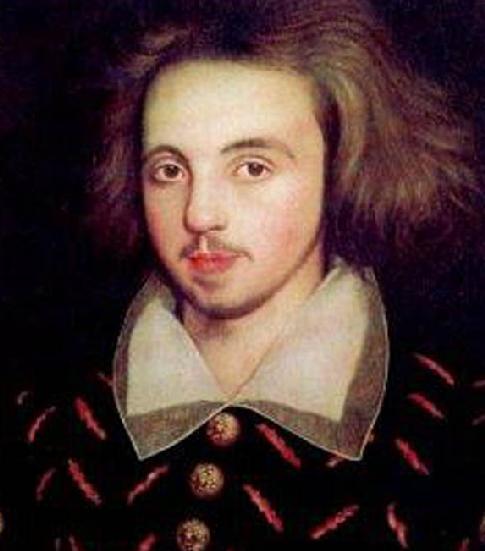
| Biography Part I |
Canterbury Boy
Born the son of a cobbler in the town of Canterbury
Student Prodigy
A scholarship to Cambridge sets him on his way
In Her Majesty's Secret Service
Recruited as an intelligence agent
Dramatic Revolutionary
Marlowe creates a new style of theatrical performance
Marlowe
The only writer with the proven ability to write poetry and dramatic verse at a "Shakespearean" level. For two centuries, scholars have proclaimed that Shakespeare learned how to write by studying Marlowe's style.
Speculation that they were friends and shared manuscripts is prompted by the striking similarity of Marlowe's later works to Shakespeare's early works.

Canterbury Boy
Born the son of a cobbler in the town of Canterbury
The poet and dramatist Christopher Marlowe was baptised at St. George's
Church, in the historic town of Canterbury, on 26th February 1564.
Christopher was the second child of John Marlowe, a shoemaker and
freeman of Canterbury, who had come there from Ospringe a village some
ten miles nearer London about eight years earlier. His mother, who had
married John in May 1561, was Katherine Arthur, from a family in Dover,
roughly fifteen miles south-east of Canterbury. Their first child, a
daughter (Mary), lived for only a very few years after Christopher's
birth, and of the other Marlowe children, only six apparently reached
adulthood Christopher himself, Margaret, Joan, Ann, Dorothy and Thomas.
Nothing is known about Christopher's education before 14th January 1579,
when he officially started at the prestigious King's School in
Canterbury. But we can infer that his gifted mind had come to the
attention of his early schoolmasters, since he went to King's School on
a scholarship. We also know from the admission requirements of the
King's School that by then he must have been not only able to read and
write but was also since he had been admitted at a relatively late age
well-versed in Latin.
Student Prodigy
A scholarship to Cambridge sets him on his way
A former Archbishop of Canterbury, Matthew Parker, had endowed in his
will a scholarship at Corpus Christi College, Cambridge, for a boy from
the King's School, and Marlowe was successful in being selected for this
by Matthew's son, Jonathan Parker. Among the requirements for selection
were to be able "at first sight to solf (OED: to sing a tune, air, etc.
to the sol-fa syllables) and sing plain song" and to be "if it may be,
such as can make a verse," suggesting that Marlowe had already
demonstrated an ability to write verse at a young age.
Towards the end of 1580, he left Canterbury for university, where he
would be officially resident for the next six-and-a-half years, gaining
his B.A. degree in 1584, and his M.A. in 1587.
From the accounts of the payment of his scholarship funds, which
depended upon his being there, and his expenditure at the College
buttery it is clear that he was occasionally absent for quite long
periods. Some seven weeks of the June-September 1582 trimester are
unaccounted for, as are another seven in April-June 1583. He was there
most of the time between July 1583 and September 1584, but for the
academic year following that (1584/5 his first full year as Dominus
Marlowe, B.A.) he seems to have been there for less than half the time
that he should have been. Although the payment records are missing for
the academic year 1585/6, the
buttery accounts show him to have been less absent then, other than
during April-June 1586, when it looks as though he was away for some
eight weeks in all.
Such absences were not necessarily unusual, however, and it must be made
clear that there is no record at all as to what he might have been doing
while he was away, other than on one occasion in August 1585, when he is
known to have been in Canterbury, having witnessed a will there. He
signed it "Christofer Marley," which is in fact the only known example
of his handwriting.
In Her Majesty's Secret Service
Recruited as an intelligence agent
Before the award of his M.A. in 1587, some rumours had apparently been
circulating that Marlowe intended ("was determined") to go to Rheims
and, having gone, to remain there. This would normally mean training for
priesthood at the Catholic College at Rheims, with the probable
intention of eventually returning to England as a Catholic subversive.
It seems that his M.A. was likely to be withheld because of this, but a
letter was sent from the Privy Council (the elite circle of men
including Lord Burghley, the Lord Treasurer, Sir Francis Walsingham, the
head of the intelligence service, and the Archbishop of Canterbury, John
Whitgift) to the University
authorities, insisting that he had no such intent. He had apparently
been employed in "matters touching the benefit of his country," and the
Privy Councillors instructed the Cambridge officials that the rumour
should be allayed by all possible means, and Marlowe should be
"furthered in the degree he was to take this next Commencement."
There is no other indication of what he might have been doing to justify
this high-powered commendation, nor who it was that had actually
employed him in "doing her Majesty good service." Though the wording of
the letter is somewhat ambiguous to modern ears, there really is little
reason to interpret it as meaning that he had already been to Rheims at
the time it was written.
The request from the Privy Council apparently worked, and he commenced
M.A. (i.e. he was awarded the degree) that July. He was just 23 years of
age, and poised to change the course of English drama.
Dramatic Revolutionary
Marlowe creates a new style of theatrical performance
While at Cambridge, Marlowe found time to translate the works of the
Roman poet Ovid, a favourite among the university-educated elite, into
English blank verse. Marlowe also wrote his first blank verse plays
while a student at Cambridge. His first great success, Tamburlaine,
written in 1587, his last year at the university, caused a sensation in
London. Nothing like it had been seen before. Here Marlowe demonstrated
his creation of true English blank verse, employing the drumming rhythm
of iambic pentameter to tell his tale. The play was such a success that
Marlowe quickly produced a sequel, Tamburlaine Part II.
These smashing successes were accompanied by the plays Dido Queen of
Carthage, Doctor Faustus, The Massacre at Paris, The Jew of Malta, and
Edward II, all to the astonishment of the London audience who were awed
by this new form of English drama.
Between 1587 and 1593, Christopher Marlowe was the greatest playwright
England had ever produced. When he ran afoul of the religious
authorities that May, ending his reign as England's most popular writer,
he was just 29 years of age.